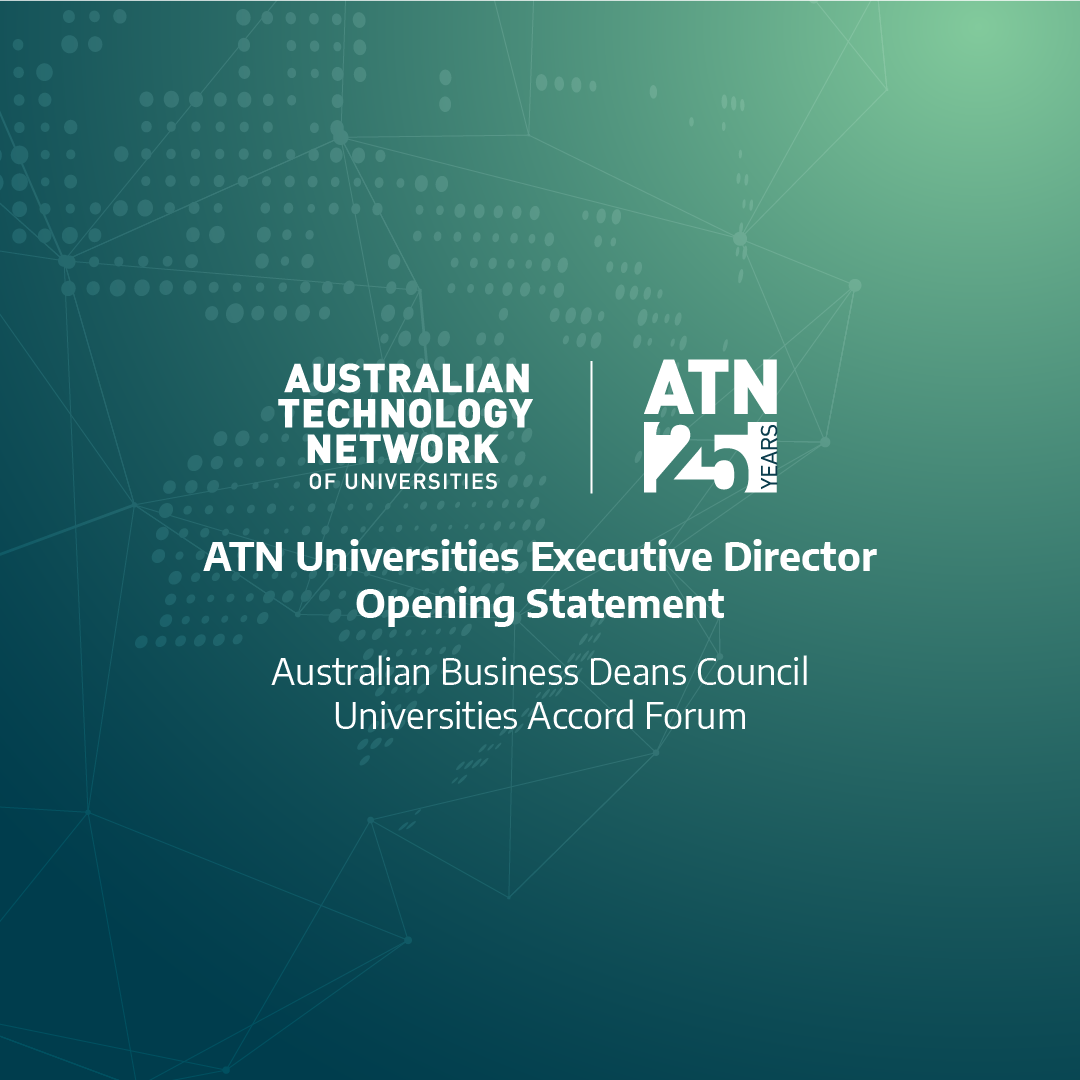ATN Universities Opening Statement: Australian Business Deans Council Universities Accord Forum
21 March 2024
ATN Universities Executive Director Opening Statement
Australian Business Deans Council Universities Accord Forum
ATN Universities supports the broad directions proposed, and particularly the ambition contained, in the Universities Accord Final report.
There is, of course, a lot of detail to be worked out and worked through, so like all the various university groupings, and the sector generally, our views are likely to develop over time.
What is outlined in the Accord report is intended to be a long-term plan for reform. It is setting the direction as we head to 2050.
The recommended reform agenda is something that will take many years to deliver. There will be a lot of contingencies along the way but of course there will be more clarity come 14 May, when the Treasurer hands down the Federal Budget.
Many of the recommended directions that the Accord proposes for Australia’s tertiary education sector are consistent with positions ATN has held for some time. ATN has been a long-time champion of universality and the successful delivery of lifelong access to education for all Australians post-secondary education. We have long argued that this should be achieved through a more closely integrated higher education and vocational education system. We’re pleased that the directions proposed in the Accord Report move us in this direction.
ATN has also argued that many students need additional assistance with living costs. ATN considers equity to be part of its DNA, and much of what is contained in the 400+ page document has elevated the student voice. Many of our students work while studying and issues of struggling to make ends meet during study are all too real for them.
The Accord recognises these issues and recommends measures to improve the situation. Among the menu of options includes increases in Youth Allowance, the Tertiary Access Payment and research stipends; reductions in student contributions, changes to HELP repayment arrangements and improvements to services and support (such as outreach programs, a National Student Ombudsman etc.)
Cost of living has been a hot topic across most days in the past few months, in political and media circles as much as it is at dinner tables. The expectation is that the upcoming Budget will pick up some of the Accord’s key recommendations in this area.
ATN has supported measures to ensure all students are able to succeed at university, particularly those from groups under-represented in higher education. An example here is ATN’s advocacy for better recognition of enabling pathways and preparatory programs for students seeking to complete a university-level qualification. The Accord has strongly recommended that we proceed in this direction. It recommended that there be ‘demand driven’ fee-free preparatory courses and that these be fully funded – a situation that we currently do not have.
The big structural reform proposed in this area is of course the proposal for a needs-based funding model to support under-represented groups to succeed. The Accord recognised ambitious attainment targets can’t be achieved without also providing additional support to students.
ATN has supported the development of new and innovative ways for students to acquire skills and knowledge throughout their lives. ATN argued for Cooperative Skills Centres to kickstart tertiary integration with industry. There is certainly a commitment to explore improvements to the AQF and the development of new skill pathways.z
The Government has opted for TAFE Centres of Excellence but the report envisages these will be used in ways not dissimilar to ATN’s Co-operative Skills Centre proposal.
The current Government, as well as the previous Government, many businesses and the business peak bodies, have been seeking to modernise our training systems and ensure newly-minted university graduates are work-ready.
The Accord recommended it be given greater priority. The subject matter is detailed and difficult. We need to ensure that proposals are trialled and that they are practical from a university perspective.
When it comes to the issue of research, there is no doubt that the eminent Accord panel has listened to what the sector has had to say.
From the ATN perspective, we advocated for a review of the national research and innovation ecosystem, covering all directly funded Commonwealth research and agencies including CSIRO and others, to drive balanced growth of medical translation and non-medical research.
We were pleased to see the Accord recommended a formal strategic, cross-portfolio examination of national research funding, including development of a multi-agency government strategy that sets medium and long-term targets for Australia’s overall national spending on R&D as a percentage of GDP. As with other pivotal areas of the Accord, ATN is keen to ensure that there is representation of sector views in any such examination and a good level of sector consultation during the development of that strategy.
As a sector it is key that we are at the table when the decisions, the models, the way forward is being pieced together – for instance the Implementation Advisory Committee – because we need to help focus the attention of Government on what is needed most now, and into the future.
The Accord has not solved everything overnight, and that was never its intention.
The terms of reference were very broad. Many of the issues encompassed are complex, and the panel was always going to have difficulty making firm recommendations for action in these areas.
In fact, the Accord recommended that the Australian Government outline a staged approach to implementation of the Review’s recommendations. That will be critical to the order in which we deal with all the issues on which further work is required.
As a sector we should help shape and inform a Tertiary Education Commission, a commission that works in close partnership with universities and Government and not one which is overly bureaucratic or burdens the sector with red-tape and regulatory requirements. The legislation for such a body will be critical and ATN will be keen to help with its development.
The Accord recommended that the Government immediately establish an Implementation Advisory Committee and it will play a critical role at least until the proposed Commission is established. Again, there will be a need for us to help inform it.
Another ATN priority for ensuring good outcomes is the block of inter-related work which is likely to be critical to advancing an integrated tertiary sector with more cross-provision between VET and higher education providers. This encompasses Accord proposals such as:
- implementing the National Skills Passport
- placing priority on progressing the recommendation of the Review of the AQF
- a national approach to recognition of prior learning (RPL) and credit recognition
- requiring higher education providers to establish early exit and articulation pathways from bachelor degrees, at diploma and associate degree levels, for students who decide to withdraw before completing the whole degree; and
- ‘ramping up skills delivery’ through collaborative infrastructure such as TAFE Centres of Excellence and the NSW Institutes of Applied Technology.
These are areas of detailed and difficult but necessary work which form part of the national skills agenda.
- Five recommendations which our analysis found could inspire prompt government decisions were across areas of additional research funding, such as:
- a new Solving Australian Challenges Strategic Fund
- increased funding for the ARC, the Research Training Program and the Research Support Program; and
- stable and predictable National Collaborative Research Infrastructure Strategy (NCRIS) funding
- And then, of course, there is the development of a national strategic framework for international education. Despite the extent of recovery post-pandemic, other factors are contributing to some ongoing turbulence across international education for higher education.
- There is much to play out but one thing for us at ATN Universities is certain, the O’Kane Accord will be as important to the next generation of tertiary education students, teachers and staff as the Dawkins and Bradly reforms were to their respective eras.
- Frank Coletta (Interim Executive Director, ATN)

